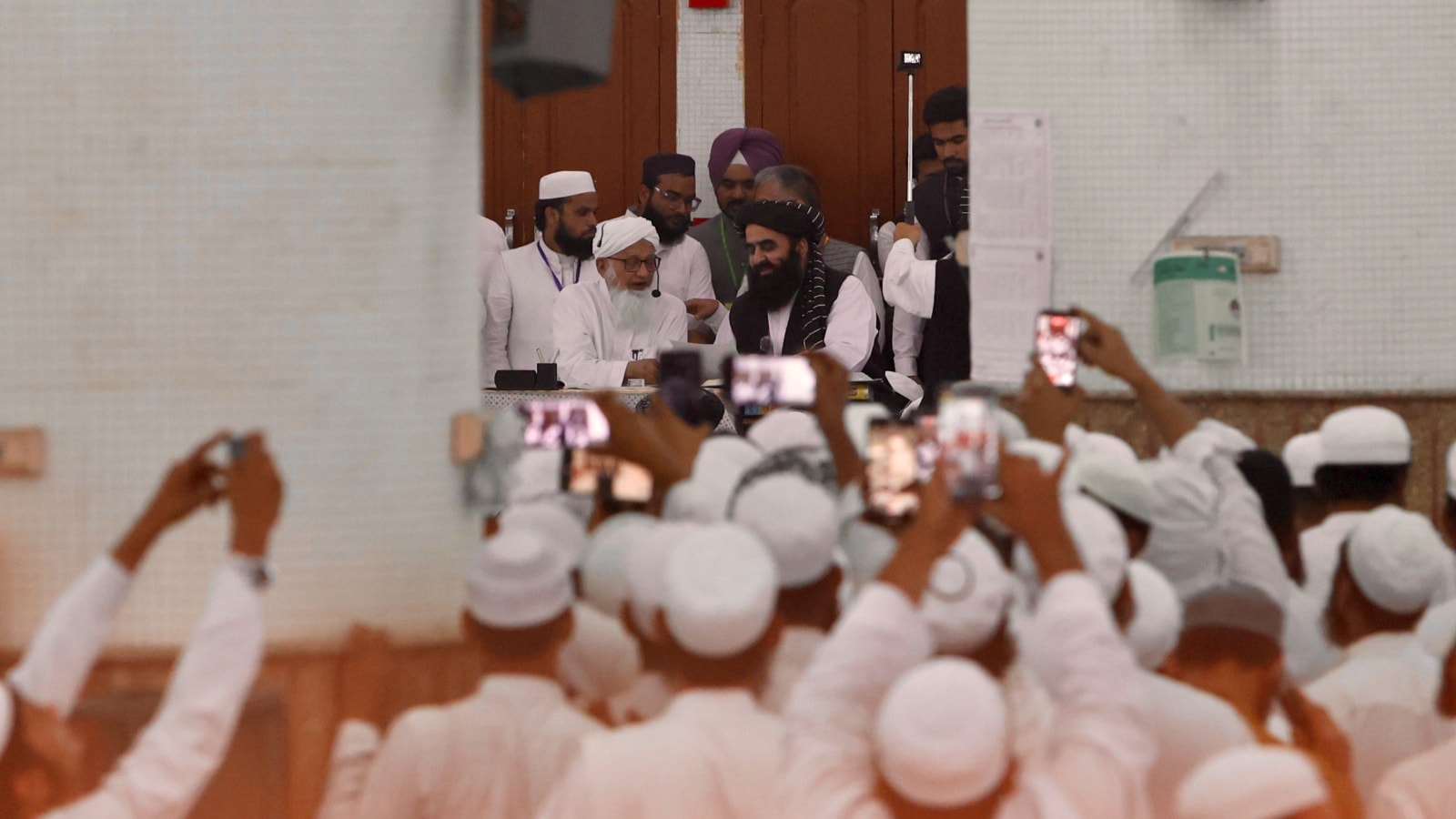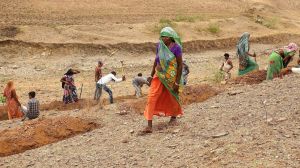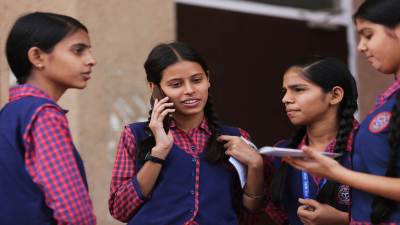It was the visiting Taliban delegation that had decided to exclude women journalists from the media briefing Friday, an event that was strongly resisted by current staffers, The Indian Express has learnt.
At the heart of the controversy is the venue: the Afghanistan Embassy on Shantipath in the capital’s Chanakyapuri diplomatic enclave.

It has a current staff strength of about 23 with six Afghans, all representing the earlier regime, the Islamic Republic of Afghanistan led by President Ashraf Ghani who fled the country in August 2021.
Ahead of Thursday’s visit by Afghanistan Foreign Minister and Taliban leader Amir Khan Muttaqi, these staffers asked Charge D’Affaires (CDA) Sayed Mohammed Ibhrahimkhil — also a representative of the erstwhile regime – not to allow the Taliban briefing to be held there.
“We knew they would want to declare this embassy as Emirates (Taliban calls it Emirate, and not the Republic), take down our flag, put theirs, and exclude women…That’s why we were resisting the move to hold the press conference in the embassy and had, instead, suggested a five-star hotel where the Taliban delegation is staying,” a source said.
The Ministry of External Affairs said Saturday it had “no involvement” in the press interaction and some officials claimed they had even suggested to the Afghan side that women journalists should be part of the invitees.
But the MEA is learnt to have asked the CDA to “cooperate and let the Taliban hold the press conference in the embassy,” an official said.
Story continues below this ad
Because the venue was the embassy, and not any private premises outside, the Taliban used the diplomatic sanctity of an embassy — protected under the Vienna convention — to exclude women.
“That gave them the immunity to block access to people that they didn’t want to come in. Initially, there were 12 people, and later it was made to 16 people — all men,” a source said.
“We all know how they behave in Afghanistan…the women in our relatives and families in Afghanistan are suffering for the last four years… Aaj kitna badnam kar diya Afghanistan ka naam (They have given such a bad name to Afghanistan today,” an Embassy staffer said. “We were not consulted about the list at all, had we known, we would have never discriminated against women journalists.”
Ironically, this when the embassy itself is contested and, officially, it is not the Taliban’s embassy yet as the Government has not formally “recognised” the regime. The government allowed the Taliban to bring in their diplomats in Delhi, after Muttaqi’s meeting with External Affairs minister S Jaishankar.
Story continues below this ad
The exclusion of women sparked outrage from Opposition political leaders and journalist groups with Leader of Opposition Rahul Gandhi saying that by allowing it, the Prime Minister is telling every woman in India that he is “too weak to stand up for them”.
Incidentally, at another event, in Vivekananda International Foundation (VIF), a pro-government think tank founded by NSA Ajit Doval, located in Chanakyapuri — barely a kilometre away from the Afghan embassy — Muttaqi attended a session with scholars, including women, who are working in the think-tank space.
Taliban could get away with their writ at the embassy; outside they didn’t have any control as was visible in VIF.
ExplainedWomen in shackles
Since they returned to power in Kabul in 2021, the Taliban have issued over 100 edicts restricting rights of women and girls: banning them from higher education and work; out of public spaces. There are also restrictions on their travel without male escorts; on even being heard singing or reading aloud from inside their homes.
Talking about the exclusion of women journalists, former Indian ambassador to Afghanistan, Vivek Katju — who has dealt with the Taliban during the 1996-2001 period as joint secretary in-charge of Pakistan-Afghanistan-Iran in the MEA — told The Indian Express, “It is regressive and I completely disapprove of it. But I am conscious of India’s strategic interests at this sensitive time in our region and the press conference was held in their embassy premises.”
Story continues below this ad
Former Indian envoy to Afghanistan Gautam Mukhopadhyay said this “illustrates the pitfalls of a realist, security-centric diplomacy in the absence of shared values of gender equality”. “It is shameful that our government does not think it worthy to uphold respect for Indian women professionals in a press conference in our own territory. It holds a mirror to our own commitment to gender equality,” he said.
Another former Indian diplomat, who attended the VIF interaction, said, “This is despicable behaviour, but we can’t force them inside their own embassy premises.”
The Opposition on Saturday termed the exclusion “unacceptable” and an “insult to women.”
Gandhi said Modi’s silence in the face of such discrimination exposes the “emptiness” of his slogans on Nari Shakti.
Story continues below this ad
Congress general secretary Priyanka Gandhi Vadra said if the prime minister’s recognition of women’s rights isn’t just convenient posturing from one election to the other, how has this “insult to some of India’s most competent women been allowed in our country”.
Calling it “highly discriminatory”, the Indian Women’s Press Corps (IWPC) raised “strong objection” to the exclusion of women journalists, and urged the Government of India to take this matter up with the Afghan Embassy to ensure that such gender- based exclusion in media briefings does not occur in the future.
Amid all this fiasco over the exclusion of the women journalists, what went unnoticed, sources said, is that the lone Afghan woman employee at the embassy left the embassy premises around 2 pm on Friday — about an hour-and-half before the Taliban Foreign minister Muttaqi’s press conference was scheduled. “She was not comfortable staying there,” said a source, as her future now looks uncertain.
The exclusion controversy followed Muttaqi to Darul Uloom seminary in Deoband Saturday where his interaction with the media was abruptly cancelled – barely 30 minutes before it was supposed to start at 2 pm.
Story continues below this ad
The cancellation came minutes after one of the clerics, distributing food packets to the mediapersons, asked a woman photojournalist how she had “managed to come in.”
Shortly, Muttaqi’s media team announced that the minister would meet Vice Chancellor and Rector Abul Qasim Nomani and other clerics behind closed doors followed by lunch. A senior police official said that the instruction to cancel the media interaction came from Muttaqi’s team.
Muttaqi arrived at the Darul Uloom at 12 pm—-on the third day of his eight day India visit—to much fanfare. Students flocked the entrance as his cavalcade entered the campus. In the library, he addressed a 4000-strong crowd of students. It was after his library event that Muttaqi went to the guest house, where he was supposed to have lunch and come back for the media interaction.
Explaining the cancellation, a member of Muttaqi’s team is said to have told the police that the Minister “thought the address was enough and he had to leave early for Delhi.”
Story continues below this ad
“I talked to the people in the Indian government and with the people of Deoband. I hope that we continue this relationship like this and make such visits more frequent,” Muttaqi said.









